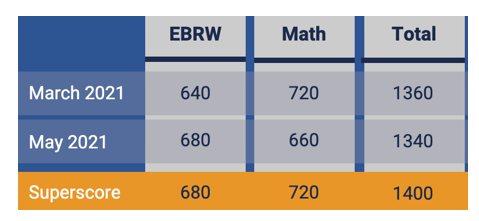 What Does “Superscore” Mean?
What Does “Superscore” Mean?
When a college “superscores” your SAT or ACT test scores, it takes the best section scores from your various test dates, and combines them to form a new total (in the case of the SAT) or composite (for the ACT).
For the SAT, that means taking your best scores from the two sections of Evidence-Based Reading and Writing (EBRW) and Math (M) and adding them together for a new total score. Here is an example of SAT superscoring:
For the ACT, this means taking your best subscores for the four sections of English, Reading, Math, and Science, and averaging them to form a new Composite score. Here is an example of ACT superscoring:
Which Colleges Superscore?
The Covid-19 pandemic affected many aspects of the college admissions landscape to provide more flexibility for students, including an increased use of superscoring the ACT. Over the last two years, more and more colleges started superscoring the ACT, including American University and Tulane. Examples of colleges that have historically superscored applicants’ ACTs even before Covid include Amherst College, Boston College, and Johns Hopkins. Public colleges that superscore the ACT include Indiana University and University of Colorado.
In contrast, most colleges already superscored the SAT, with the exception of a few public universities, such as Ohio State, Penn State, and University of Wisconsin. This means that they will use the student’s highest combined score from one single test date.
How are SAT and ACT Test Scores Reported to Colleges?
Typically students send scores directly to colleges through the College Board or ACT websites; and scores must be sent by entire test date, not individual section. Release your official score reports once you have finalized your college list and your standardized testing plan.
A recent trend is for some colleges to allow students to self-report the scores on the Common Application and only require that students release their score reports from the College Board or ACT if they matriculate. The motive is to increase access for students who cannot afford the fees of sending scores to all of the colleges to which they are applying. Some schools that allow self-reported standardized test scores on your application include: Boston University, Columbia University, Swarthmore College, University of North Carolina-Chapel Hill, and Washington University in St. Louis.
Our Recommendations
In general, colleges look more closely at the test sections that correspond to your intended major. For students planning to major in business or engineering, the math sections are very important. For students with interests in the humanities, the verbal sections carry more weight.
Evaluate your college list and the individual policies of your colleges. Make a chart to organize the information about which colleges superscore the SAT and/or ACT; this may well impact your college list as well as your consideration of where to apply early in making “reach” colleges more attainable. For information on whether to retake the SAT or ACT, read our blog post.
At Collegiate Gateway, we are eager to share our expertise and guide you on all aspects of your admissions strategy – from testing to your college list to your essays. Contact us for a complimentary consultation and check out our events page for future college admissions presentations. We’re always happy to help!


